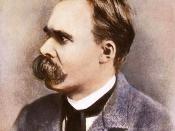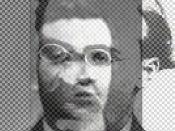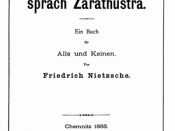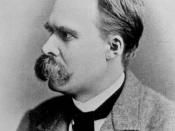An author writes to convey information to the reader. Frequently, it is important not only what the author says but also how and why he says it. For example, the famous philosopher, Friedrich Nietzsche, uses many different methods to reveal his messages to the reader. One of Nietzsche's major beliefs is that it is his purpose in life to aid the rest of mankind. One text where Nietzsche reveals this point is in the short story, "Thus Spoke Zarathustra." In this story, Nietzsche writes about a man, Zarathustra, who at the age of thirty leaves his home to go live in the mountains in solitude. After ten years, something inside Zarathustra changes, and he feels that he has something to share with the world. Nietzsche uses many different methods throughout this writing to convey his message. He shows the reader the fairly obvious denotation of his writing, as well as employing the use of various literary techniques, such as diction, style, and rhetorical figures.
First of all, Nietzsche's writing has its literal meaning. After living in the mountains for ten years, Zarathustra looks at the sun and says. "You great star [sun], what would your happiness be had you not those for whom you shine?" (121). Zarathustra believes that the sun is only "happy" or useful if other things are benefiting from its existence. Zarathustra then states, "For ten years you have climbed to my cave: you would have tired of your light and of the journey had it not been for me and my eagle and my serpent" (121). Here Nietzsche means that without something using the sun there is no reason for the sun to exist. The sun solely exists to satisfy the needs of other things. This process of satisfying others is what satisfies the sun. Next, Zarathustra comments, "Behold, I am weary of my wisdom, like the bee that has gathered too much honey; I need hands outstretched to receive it" (122). Nietzsche is telling the reader that the excess product that the bee makes has no value to the bee unless it is used by something else. Nietzsche plainly shows that entities only live to help satisfy other things. If Nietzsche gains knowledge about something, then it is his duty to share what he has learned with others.
In addition to the literal meanings from the previously mentioned passages, Nietzsche's words have figurative importance as well. For example, in the quotations previously mentioned, Nietzsche gives human qualities to the sun. When he writes that the sun "climbs to his cave" and is able to get "tired," Nietzsche allows the sun to possess qualities that are enjoyed by mankind. This use of personification of the sun allows Nietzsche to explain his belief that he, himself, is like the sun. The sun gives light and needs receivers. Similarly, the already mentioned bee gives honey and needs receivers. Nietzsche uses these metaphors to help explain that he needs receivers for the product that he has to give, knowledge. Furthermore, Nietzsche uses these specific words on purpose. The word "light" is a common metaphor for knowledge or the truth. Both light and honey have reasonably obvious connotations. These words have the qualities of being golden and yellow. These descriptions help to show that these objects are important. Also, Zarathustra says, "For that I must descend to the depths, as you do in the evening when you go behind the sea and still bring light to the underworld, you overrich star.
"Like you, I must go under""go down, as is said by man, to whom I want to descend" (122).
Here is where Nietzsche makes the comparison between the sun and himself even more apparent. By "go under," Nietzsche means that it is not enough for him to grasp his knowledge for himself; he has a responsibility to descend back into the world that contains other people and enlighten mankind. He feels that in some respects he is above the people who do not have his knowledge. Zarathustra declares, "But we waited for you [sun] every morning, took your overflow from you, and blessed you for it" (122). Here Nietzsche places the sun as being almost godlike; it is above or more important when compared with its surroundings. Nietzsche probably does not see himself as a God. However, if Nietzsche does in fact consider himself to be like the sun, then he is stating that he is above the rest of mankind because they do not have his knowledge. He feels he has an important truth to share with people who have their "hands outstretched." He thinks that it is his obligation to share what he feels is the truth with others.
Nietzsche employs these various techniques for specific reasons. For instance, he is writing for different groups of people. He wants as many people as possible to be able to take something and learn from his writing. If he simply wrote in a more rigorous dialectic, then his writing would lose its impact on his uneducated followers. But, if he writes solely in simple prose, then he loses the interest of many of the cultured part of the population, such as his fellow philosophers. Nietzsche believes that he is the sole provider of a certain truth, and he wants the masses to learn from him.
Work Cited Kaufmann, Walter, ed. trans. The Portable Nietzsche. New York: Penguin, 1982.





